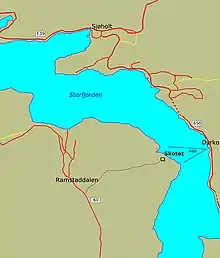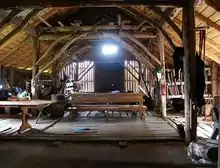Ytste Skotet
Ytste Skotet is a complete, preserved, historical farm located in Fjord Municipality in Møre og Romsdal county, Norway. The historic farmyard and museum, which is part of the Sunnmøre Museum Foundation, is located on the steep shores of the Storfjorden in the Sunnmøre district of the county. The farm is located across the fjord from the village of Dyrkorn. The Storfjordens Venner association owns Ytste Skotet and has orchestrated the restoration of the farm. The foundation Ytste Skotet administers the farm's operation and maintenance, employs workers, and serves as general manager.[1][2]

Name
Ytste Skotet is one of three related farms. The other two are Me-Skotet (me is local dialect for "middle") and Inste Skotet (inste is local dialect for innermost). The name Skotet (pronounced Skøt-e where "ø" sounds like the "u" in "curling" and the "e" like the "o" in fjord) signifies a high elevation projecting point of land.
Operation
The farm is well preserved and maintained. It is a typical pre-industrial operation that remained in use until modern times; the activities still shown here are representative of the old ways of the mountain-and-fjord farms along the Storfjorden. The fishing in the fjord was an important contribution to the farm household economy. The mountain dairy farm (or støl) was still in use, but in the most recent years the cheese was made at the farm rather than at the støl. The farm grew barley and oats and had timber sufficient for their own use. To get enough fodder, they harvested hay in the outlying fields; the hay was stored in outlying barns and transported home on a sledge when appropriate snow conditions existed. The buildings and the cultivated landscape, as preserved, reflect this way of operating the farm.
History

The place is mentioned in Middle Ages sources such as the Flateyarbok, Formannsogur, and Heimskringla. Tradition as documented in the sagas tells that there was a farm by this name at this location in the days of King Håkon the Good (i.e., the 10th century). After the serious depopulation of the region resulting from the Black Death in the late 1340s, the farm was again mentioned in historic records in 1606. There are also undocumented sites of constructions which have been identified on the farm.
Ane Karoline Vidhammar was the last farmer at Ytste Skotet; she operated the farm with her son, Knut Olav, and her daughter, Jenny Olea, until the farm was vacated in 1954. The place lay fallow until 1989 when the property, comprising 750 acres (3.0 km2), was assigned to the Storfjordens Venner (The Friends of the Great Fjord) foundation, which has rehabilitated the buildings and the cultivated landscape. The place has been restored to represent it as it existed when the farm was last in operation.
Future
Norsk Kulturråd (Norwegian Culture Council) has selected Ytste Skotet to be one of nine projects in Norway working under the motto "Children, youngsters, and museums". The farm has become a pilot project and the very preservation assumes continuation of the old ways of operating. In the summer season, the foundation receives schools and visitors and keeps courses with possibilities for serving and accommodation.[3]
Access
- Easiest access is by boat from Dyrkorn – Transport: Dyrkorn - Skotet
- One may also access the farm in a couple of hours by foot traveling over the mountain from Ramstaddalen in Sykkylven Municipality.[4]
Media gallery
 View towards Skotet. Ytste Skotet at the right, Meskotet to the left of the middle and Inste Skotet outermost left.
View towards Skotet. Ytste Skotet at the right, Meskotet to the left of the middle and Inste Skotet outermost left. Ytste Skotet
Ytste Skotet Breastshot water wheel which powered the wood splitting machine in the barn at the farm.
Breastshot water wheel which powered the wood splitting machine in the barn at the farm. Ytste Skotet
Ytste Skotet The main house
The main house Baking crispbread in the kitchen
Baking crispbread in the kitchen Living room
Living room Wide and open meadows at Ytste Skotet
Wide and open meadows at Ytste Skotet
References
- "Ytste-Skotet". Fjord Norge AS. Retrieved October 1, 2017.
- "1995 - Ytste-Skotet". Storfjordens Vvenner. Retrieved October 1, 2017.
- "Ytste Skotet" (in Norwegian). Stiftinga Sunnmøres Museum. Retrieved 2010-10-16.
- "Ytste Skotet". kulturarv.no. Retrieved 2010-10-16.
External links
- Olavsrosa (in Norwegian)
- Stiftinga Ytste Skotet (in Norwegian)
- Ytste Skotet (in Norwegian)
- Ytste Skotet, a living museum (in Norwegian)